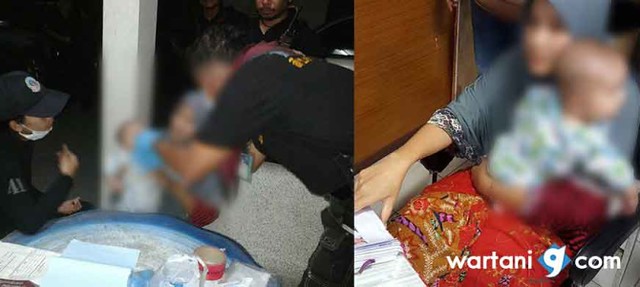Security officers in the restive Deep South collected DNA samples of a five-month-old child believed to be the son of a fugitive suspect in a 2012 Hat Yai bombing.
According to Wartani, a local media outlet in Thailand’s Deep South, a special task force of border rangers and police investigators on Sunday, 22 November 2015, raided a house in Don Rak Subdistrict of Nong Chik District in Pattani Province.
The house belongs to Ma-u-sen Waeji and Jaepatimoe Waeji.
Somareeya Malee, wife of Seri Waemamu, a suspect in the March 2012 Lee Garden Plaza Hotel bombing, which killed four people and injured at least 300 in Hat Yai District of Songkhla Province, was residing in the house. Seri has been at large since the explosion.
The officers searched the house, but found nothing illegal. They then proceeded to collect DNA samples of the residents of the house, including that of Shaleef Malee, a five-month-old baby.
Wartani reported that Shaleef is the son of the Lee Garden Bombing suspect.
Abdul Korhar Awaeputae, Director of the Muslim Attorney Centre (MAC) in Pattani, pointed out that the collection of DNA samples by the authorities is arbitrary and against human rights.
He pointed out that the authorities can only collect DNA samples from crime suspects provided that the suspects are informed of the allegations.
“If the officers want to collect DNA samples, [they] can do it if they are investigators who want to collect DNA samples of the suspects and the suspects have the right to refuse. If [the officers] collect DNA samples only to store them in a database, there is no law that supports this,” Abdul said.

Security officers in Pattani collected DNA samples from a five-month-old child on 22 November 2015 (courtesy of Wartani)
According to Reuters, the police chief in the southern border provinces told the media that DNA samples of more than 40,000 people in the region have now been collected to facilitate the arrest and prosecution of southern insurgent suspects.
MAC stated that the number of security-related charges this year will exceed that of 2014 because 22 people were already charged in the first four months of 2015, partially as a result of DNA evidence, Reuters reported.
The Committee on the Elimination of Racial Discrimination under the UN Office of the High Commissioner for Human Rights (OHCHR) on 29 June 2015 released a communication which was made to the Thai government regarding the collection of DNA samples from persons suspected of involvement in Muslim insurgent groups in the restive southern border provinces.
The UN letter to the Thai government pointed out that security officers in the three southern border provinces of Yala, Pattani, and Narathiwat have increasingly used arbitrary collection of DNA samples as a way to counter the southern unrest.
Similar to the UN, the National Human Rights Commission of Thailand (NHRC) on 20 April 2015 issued a report on the use of DNA tests on Muslim people in the region.
The report pointed out that although the Thai Criminal Procedure Code and martial law imposed in the three restive southern provinces give security officers the authority to collect evidence of insurgent suspects if deemed necessary, the procedures by which DNA samples are usually obtained are derogatory to human rights and the dignity of individuals.
“The sub-committee of the NHRC in the southern border provinces sees that the authorities can only perform searches on the outer physical features, but the examination and collection of DNA samples of certain age-group populations [youth] cannot be done because it violates human rights,” according to the NHRC report.

